Entrepreneurship and Small Business Management
VerifiedAdded on 2023/01/19
|18
|4746
|53
AI Summary
This report covers topics such as examining different types of entrepreneurial ventures and typology of entrepreneurship, exploring the similarities and differences between entrepreneurial ventures, interpreting data and statistics for micro and small businesses, and discussing the importance of small businesses for the growth of social economy.
Contribute Materials
Your contribution can guide someone’s learning journey. Share your
documents today.
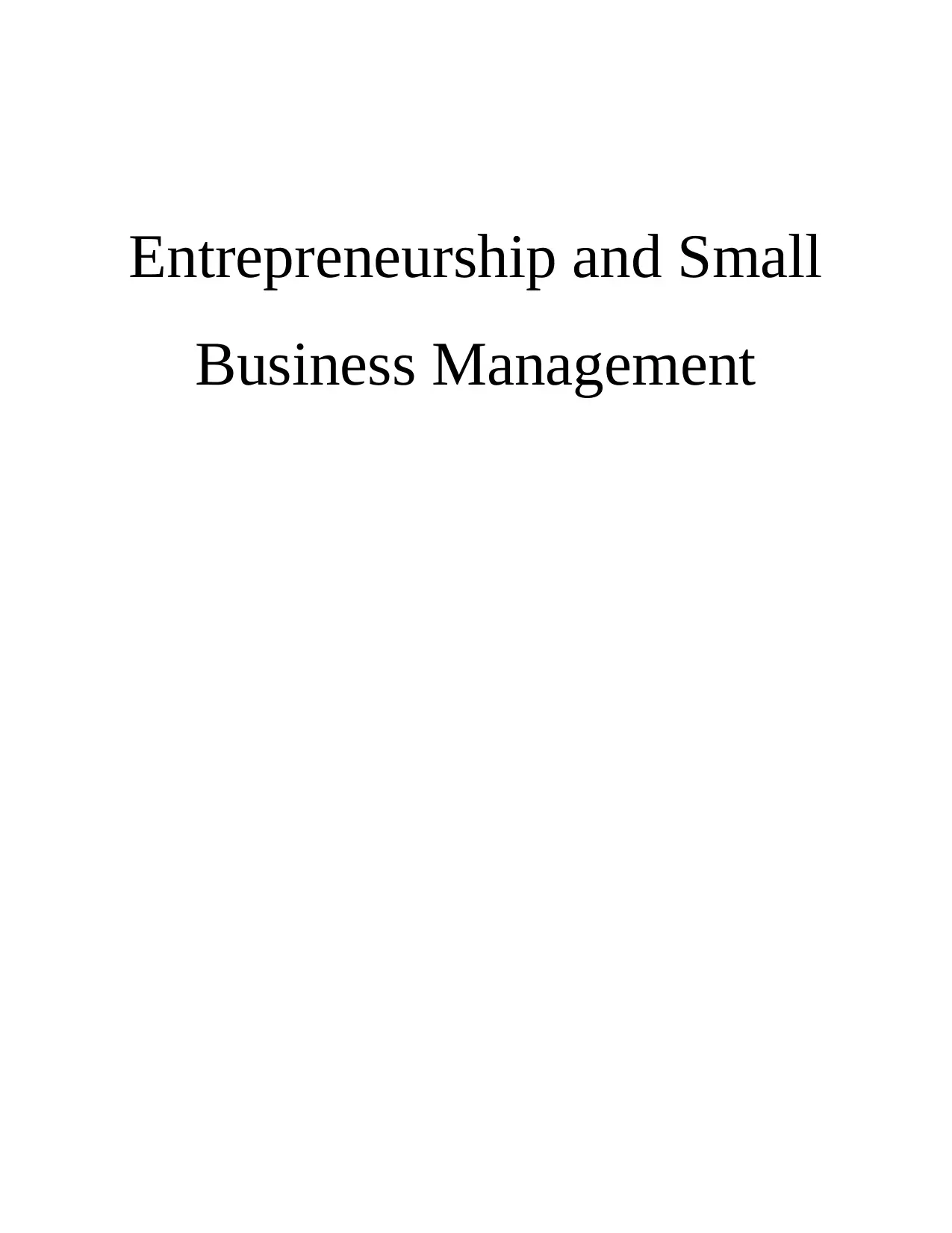
Entrepreneurship and Small
Business Management
Business Management
Secure Best Marks with AI Grader
Need help grading? Try our AI Grader for instant feedback on your assignments.
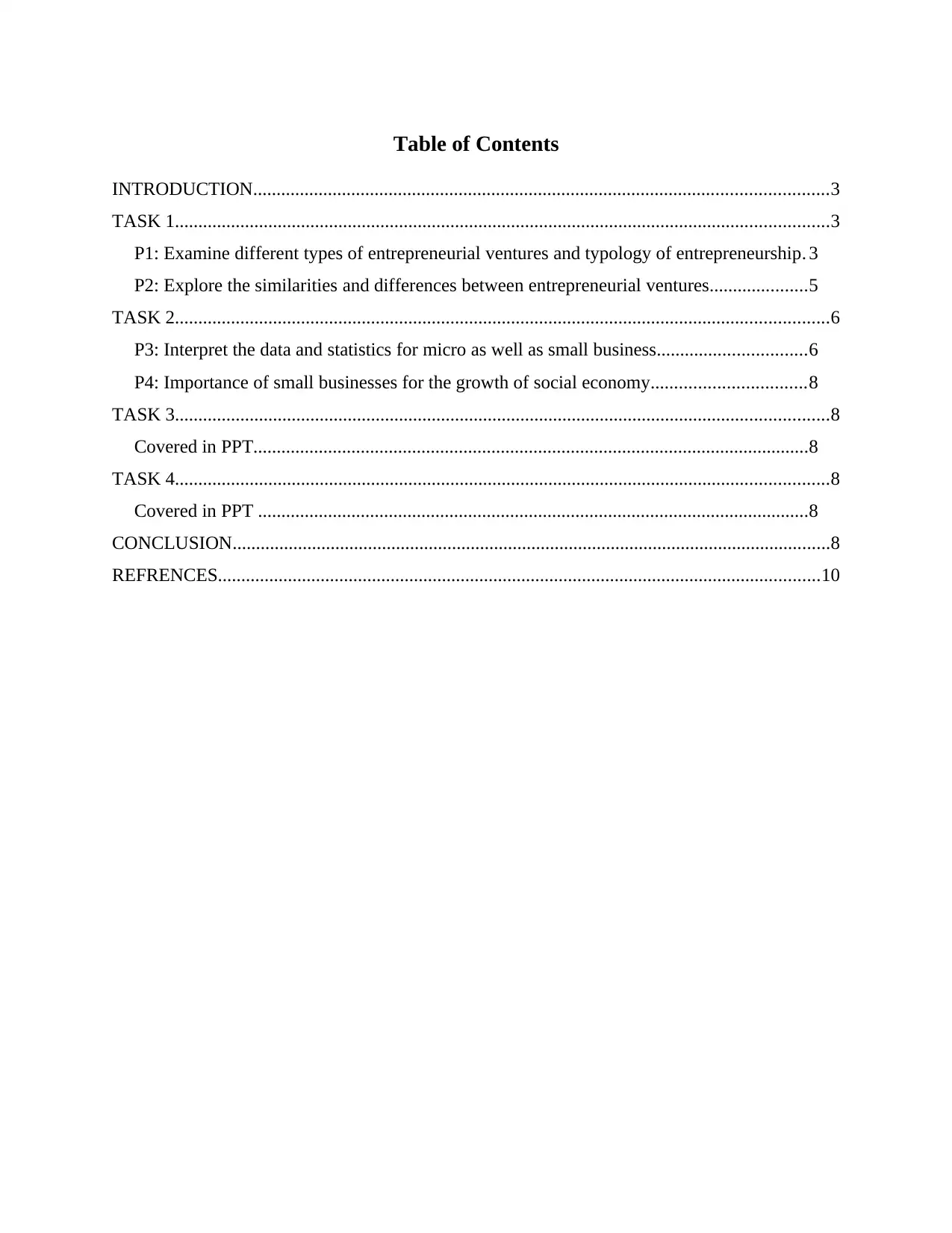
Table of Contents
INTRODUCTION...........................................................................................................................3
TASK 1............................................................................................................................................3
P1: Examine different types of entrepreneurial ventures and typology of entrepreneurship. 3
P2: Explore the similarities and differences between entrepreneurial ventures.....................5
TASK 2............................................................................................................................................6
P3: Interpret the data and statistics for micro as well as small business................................6
P4: Importance of small businesses for the growth of social economy.................................8
TASK 3............................................................................................................................................8
Covered in PPT.......................................................................................................................8
TASK 4............................................................................................................................................8
Covered in PPT ......................................................................................................................8
CONCLUSION................................................................................................................................8
REFRENCES.................................................................................................................................10
INTRODUCTION...........................................................................................................................3
TASK 1............................................................................................................................................3
P1: Examine different types of entrepreneurial ventures and typology of entrepreneurship. 3
P2: Explore the similarities and differences between entrepreneurial ventures.....................5
TASK 2............................................................................................................................................6
P3: Interpret the data and statistics for micro as well as small business................................6
P4: Importance of small businesses for the growth of social economy.................................8
TASK 3............................................................................................................................................8
Covered in PPT.......................................................................................................................8
TASK 4............................................................................................................................................8
Covered in PPT ......................................................................................................................8
CONCLUSION................................................................................................................................8
REFRENCES.................................................................................................................................10
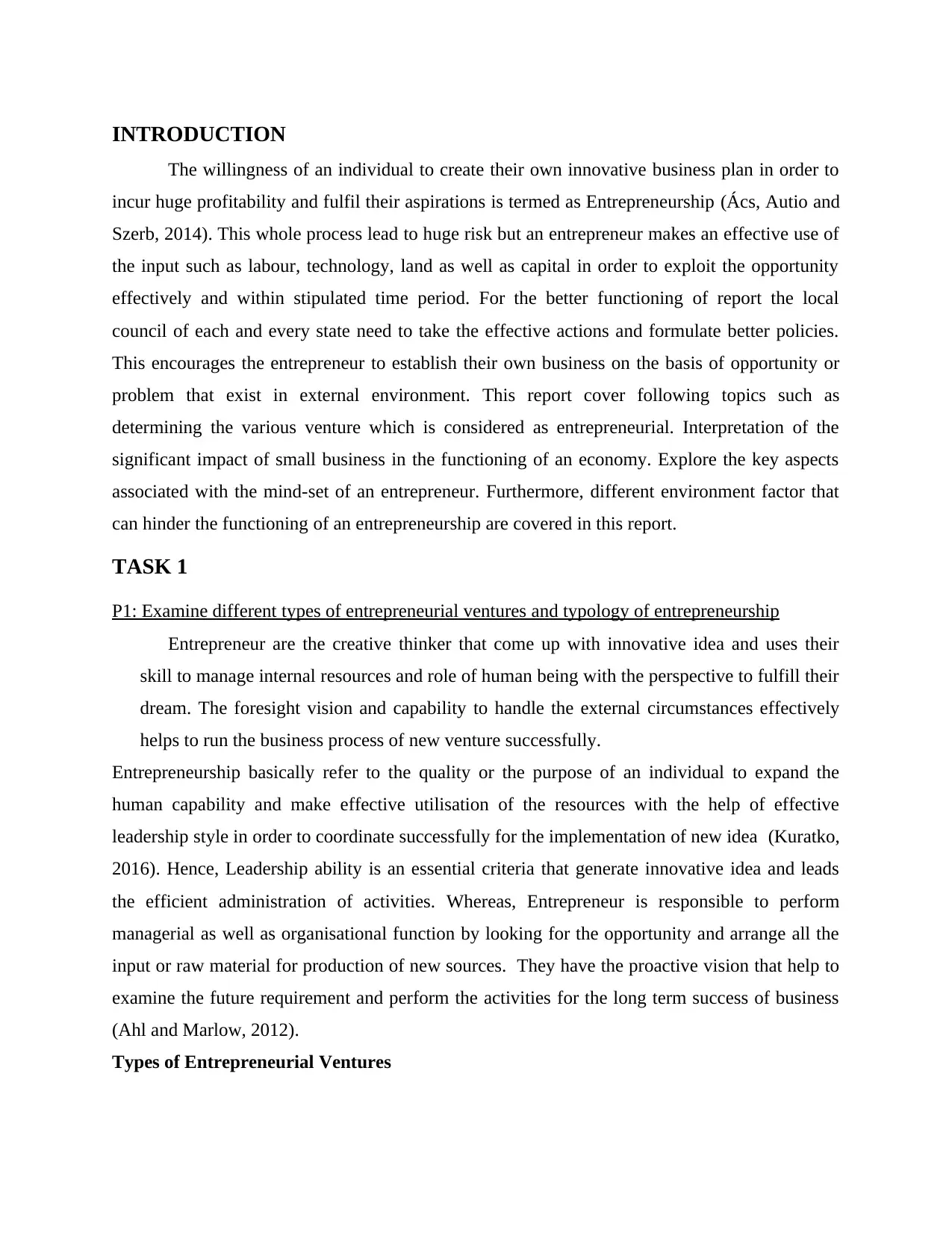
INTRODUCTION
The willingness of an individual to create their own innovative business plan in order to
incur huge profitability and fulfil their aspirations is termed as Entrepreneurship (Ács, Autio and
Szerb, 2014). This whole process lead to huge risk but an entrepreneur makes an effective use of
the input such as labour, technology, land as well as capital in order to exploit the opportunity
effectively and within stipulated time period. For the better functioning of report the local
council of each and every state need to take the effective actions and formulate better policies.
This encourages the entrepreneur to establish their own business on the basis of opportunity or
problem that exist in external environment. This report cover following topics such as
determining the various venture which is considered as entrepreneurial. Interpretation of the
significant impact of small business in the functioning of an economy. Explore the key aspects
associated with the mind-set of an entrepreneur. Furthermore, different environment factor that
can hinder the functioning of an entrepreneurship are covered in this report.
TASK 1
P1: Examine different types of entrepreneurial ventures and typology of entrepreneurship
Entrepreneur are the creative thinker that come up with innovative idea and uses their
skill to manage internal resources and role of human being with the perspective to fulfill their
dream. The foresight vision and capability to handle the external circumstances effectively
helps to run the business process of new venture successfully.
Entrepreneurship basically refer to the quality or the purpose of an individual to expand the
human capability and make effective utilisation of the resources with the help of effective
leadership style in order to coordinate successfully for the implementation of new idea (Kuratko,
2016). Hence, Leadership ability is an essential criteria that generate innovative idea and leads
the efficient administration of activities. Whereas, Entrepreneur is responsible to perform
managerial as well as organisational function by looking for the opportunity and arrange all the
input or raw material for production of new sources. They have the proactive vision that help to
examine the future requirement and perform the activities for the long term success of business
(Ahl and Marlow, 2012).
Types of Entrepreneurial Ventures
The willingness of an individual to create their own innovative business plan in order to
incur huge profitability and fulfil their aspirations is termed as Entrepreneurship (Ács, Autio and
Szerb, 2014). This whole process lead to huge risk but an entrepreneur makes an effective use of
the input such as labour, technology, land as well as capital in order to exploit the opportunity
effectively and within stipulated time period. For the better functioning of report the local
council of each and every state need to take the effective actions and formulate better policies.
This encourages the entrepreneur to establish their own business on the basis of opportunity or
problem that exist in external environment. This report cover following topics such as
determining the various venture which is considered as entrepreneurial. Interpretation of the
significant impact of small business in the functioning of an economy. Explore the key aspects
associated with the mind-set of an entrepreneur. Furthermore, different environment factor that
can hinder the functioning of an entrepreneurship are covered in this report.
TASK 1
P1: Examine different types of entrepreneurial ventures and typology of entrepreneurship
Entrepreneur are the creative thinker that come up with innovative idea and uses their
skill to manage internal resources and role of human being with the perspective to fulfill their
dream. The foresight vision and capability to handle the external circumstances effectively
helps to run the business process of new venture successfully.
Entrepreneurship basically refer to the quality or the purpose of an individual to expand the
human capability and make effective utilisation of the resources with the help of effective
leadership style in order to coordinate successfully for the implementation of new idea (Kuratko,
2016). Hence, Leadership ability is an essential criteria that generate innovative idea and leads
the efficient administration of activities. Whereas, Entrepreneur is responsible to perform
managerial as well as organisational function by looking for the opportunity and arrange all the
input or raw material for production of new sources. They have the proactive vision that help to
examine the future requirement and perform the activities for the long term success of business
(Ahl and Marlow, 2012).
Types of Entrepreneurial Ventures
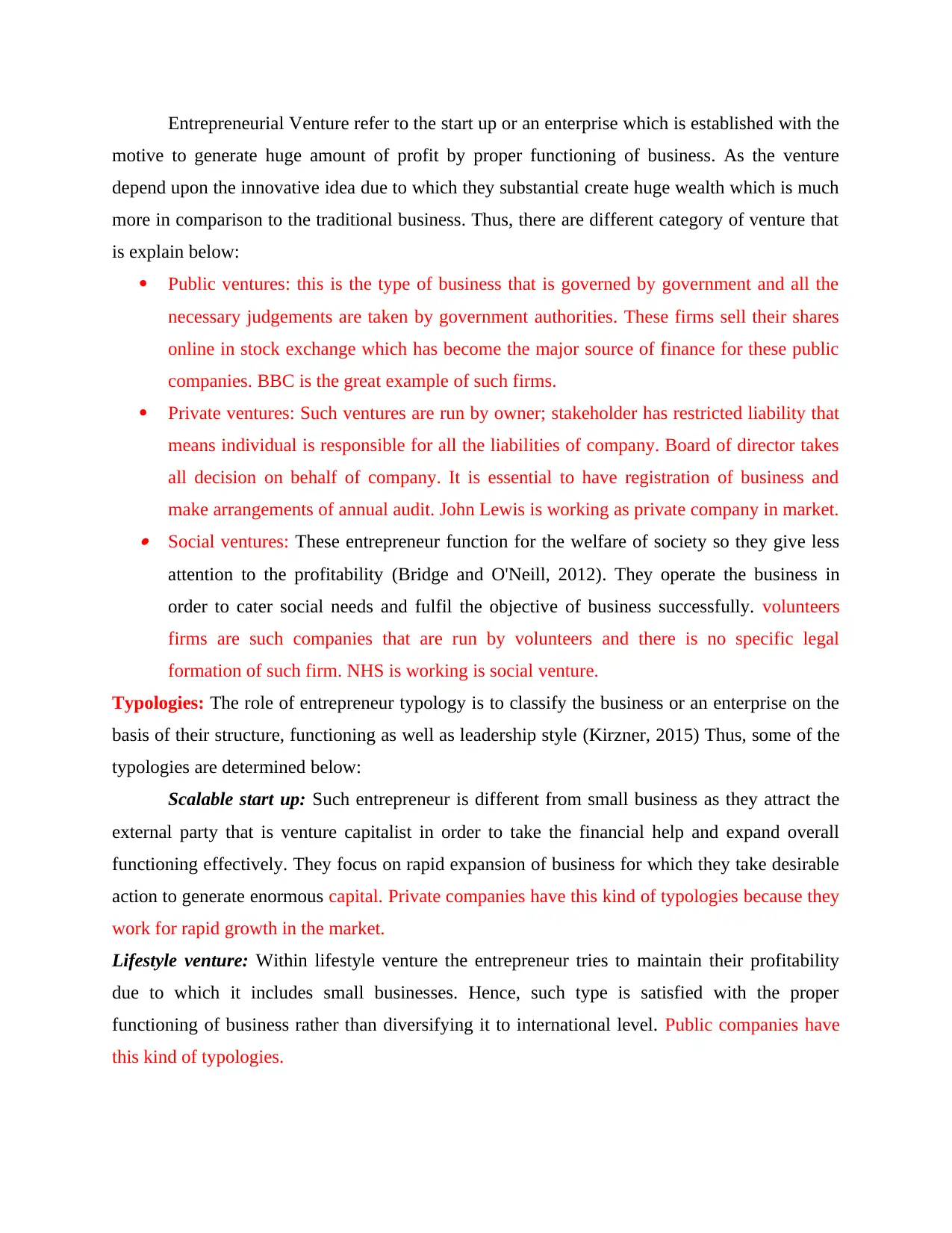
Entrepreneurial Venture refer to the start up or an enterprise which is established with the
motive to generate huge amount of profit by proper functioning of business. As the venture
depend upon the innovative idea due to which they substantial create huge wealth which is much
more in comparison to the traditional business. Thus, there are different category of venture that
is explain below:
Public ventures: this is the type of business that is governed by government and all the
necessary judgements are taken by government authorities. These firms sell their shares
online in stock exchange which has become the major source of finance for these public
companies. BBC is the great example of such firms.
Private ventures: Such ventures are run by owner; stakeholder has restricted liability that
means individual is responsible for all the liabilities of company. Board of director takes
all decision on behalf of company. It is essential to have registration of business and
make arrangements of annual audit. John Lewis is working as private company in market. Social ventures: These entrepreneur function for the welfare of society so they give less
attention to the profitability (Bridge and O'Neill, 2012). They operate the business in
order to cater social needs and fulfil the objective of business successfully. volunteers
firms are such companies that are run by volunteers and there is no specific legal
formation of such firm. NHS is working is social venture.
Typologies: The role of entrepreneur typology is to classify the business or an enterprise on the
basis of their structure, functioning as well as leadership style (Kirzner, 2015) Thus, some of the
typologies are determined below:
Scalable start up: Such entrepreneur is different from small business as they attract the
external party that is venture capitalist in order to take the financial help and expand overall
functioning effectively. They focus on rapid expansion of business for which they take desirable
action to generate enormous capital. Private companies have this kind of typologies because they
work for rapid growth in the market.
Lifestyle venture: Within lifestyle venture the entrepreneur tries to maintain their profitability
due to which it includes small businesses. Hence, such type is satisfied with the proper
functioning of business rather than diversifying it to international level. Public companies have
this kind of typologies.
motive to generate huge amount of profit by proper functioning of business. As the venture
depend upon the innovative idea due to which they substantial create huge wealth which is much
more in comparison to the traditional business. Thus, there are different category of venture that
is explain below:
Public ventures: this is the type of business that is governed by government and all the
necessary judgements are taken by government authorities. These firms sell their shares
online in stock exchange which has become the major source of finance for these public
companies. BBC is the great example of such firms.
Private ventures: Such ventures are run by owner; stakeholder has restricted liability that
means individual is responsible for all the liabilities of company. Board of director takes
all decision on behalf of company. It is essential to have registration of business and
make arrangements of annual audit. John Lewis is working as private company in market. Social ventures: These entrepreneur function for the welfare of society so they give less
attention to the profitability (Bridge and O'Neill, 2012). They operate the business in
order to cater social needs and fulfil the objective of business successfully. volunteers
firms are such companies that are run by volunteers and there is no specific legal
formation of such firm. NHS is working is social venture.
Typologies: The role of entrepreneur typology is to classify the business or an enterprise on the
basis of their structure, functioning as well as leadership style (Kirzner, 2015) Thus, some of the
typologies are determined below:
Scalable start up: Such entrepreneur is different from small business as they attract the
external party that is venture capitalist in order to take the financial help and expand overall
functioning effectively. They focus on rapid expansion of business for which they take desirable
action to generate enormous capital. Private companies have this kind of typologies because they
work for rapid growth in the market.
Lifestyle venture: Within lifestyle venture the entrepreneur tries to maintain their profitability
due to which it includes small businesses. Hence, such type is satisfied with the proper
functioning of business rather than diversifying it to international level. Public companies have
this kind of typologies.
Secure Best Marks with AI Grader
Need help grading? Try our AI Grader for instant feedback on your assignments.
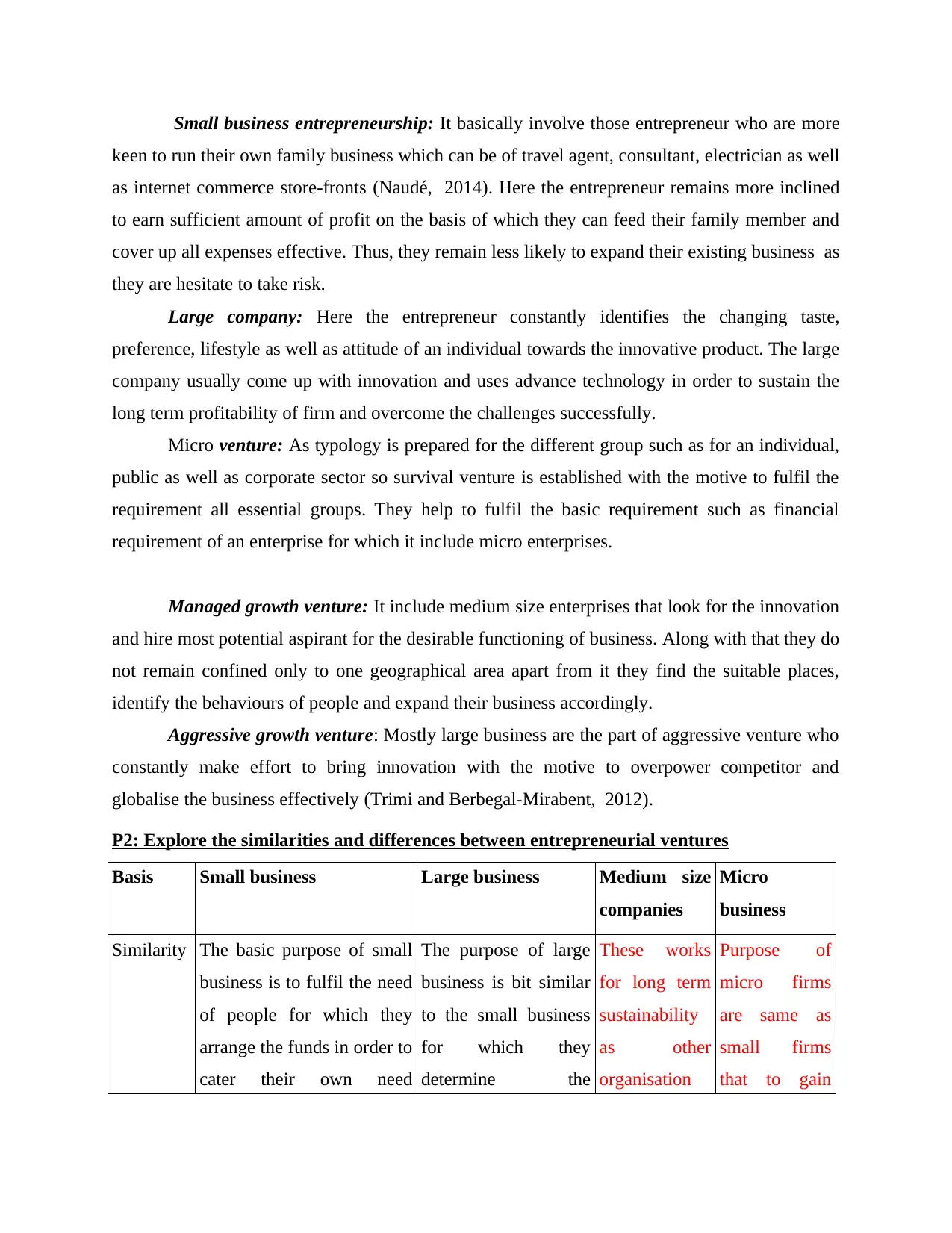
Small business entrepreneurship: It basically involve those entrepreneur who are more
keen to run their own family business which can be of travel agent, consultant, electrician as well
as internet commerce store-fronts (Naudé, 2014). Here the entrepreneur remains more inclined
to earn sufficient amount of profit on the basis of which they can feed their family member and
cover up all expenses effective. Thus, they remain less likely to expand their existing business as
they are hesitate to take risk.
Large company: Here the entrepreneur constantly identifies the changing taste,
preference, lifestyle as well as attitude of an individual towards the innovative product. The large
company usually come up with innovation and uses advance technology in order to sustain the
long term profitability of firm and overcome the challenges successfully.
Micro venture: As typology is prepared for the different group such as for an individual,
public as well as corporate sector so survival venture is established with the motive to fulfil the
requirement all essential groups. They help to fulfil the basic requirement such as financial
requirement of an enterprise for which it include micro enterprises.
Managed growth venture: It include medium size enterprises that look for the innovation
and hire most potential aspirant for the desirable functioning of business. Along with that they do
not remain confined only to one geographical area apart from it they find the suitable places,
identify the behaviours of people and expand their business accordingly.
Aggressive growth venture: Mostly large business are the part of aggressive venture who
constantly make effort to bring innovation with the motive to overpower competitor and
globalise the business effectively (Trimi and Berbegal-Mirabent, 2012).
P2: Explore the similarities and differences between entrepreneurial ventures
Basis Small business Large business Medium size
companies
Micro
business
Similarity The basic purpose of small
business is to fulfil the need
of people for which they
arrange the funds in order to
cater their own need
The purpose of large
business is bit similar
to the small business
for which they
determine the
These works
for long term
sustainability
as other
organisation
Purpose of
micro firms
are same as
small firms
that to gain
keen to run their own family business which can be of travel agent, consultant, electrician as well
as internet commerce store-fronts (Naudé, 2014). Here the entrepreneur remains more inclined
to earn sufficient amount of profit on the basis of which they can feed their family member and
cover up all expenses effective. Thus, they remain less likely to expand their existing business as
they are hesitate to take risk.
Large company: Here the entrepreneur constantly identifies the changing taste,
preference, lifestyle as well as attitude of an individual towards the innovative product. The large
company usually come up with innovation and uses advance technology in order to sustain the
long term profitability of firm and overcome the challenges successfully.
Micro venture: As typology is prepared for the different group such as for an individual,
public as well as corporate sector so survival venture is established with the motive to fulfil the
requirement all essential groups. They help to fulfil the basic requirement such as financial
requirement of an enterprise for which it include micro enterprises.
Managed growth venture: It include medium size enterprises that look for the innovation
and hire most potential aspirant for the desirable functioning of business. Along with that they do
not remain confined only to one geographical area apart from it they find the suitable places,
identify the behaviours of people and expand their business accordingly.
Aggressive growth venture: Mostly large business are the part of aggressive venture who
constantly make effort to bring innovation with the motive to overpower competitor and
globalise the business effectively (Trimi and Berbegal-Mirabent, 2012).
P2: Explore the similarities and differences between entrepreneurial ventures
Basis Small business Large business Medium size
companies
Micro
business
Similarity The basic purpose of small
business is to fulfil the need
of people for which they
arrange the funds in order to
cater their own need
The purpose of large
business is bit similar
to the small business
for which they
determine the
These works
for long term
sustainability
as other
organisation
Purpose of
micro firms
are same as
small firms
that to gain
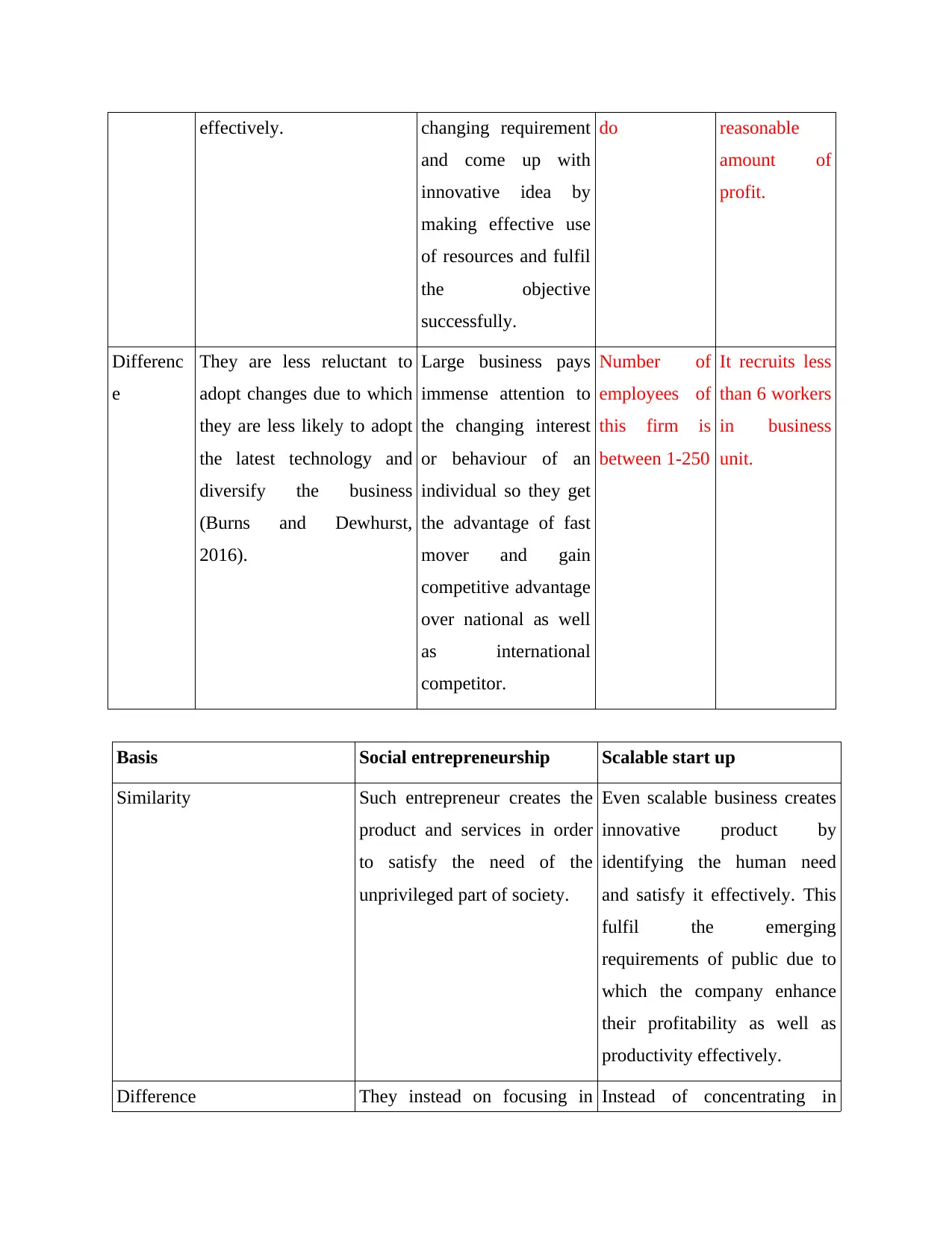
effectively. changing requirement
and come up with
innovative idea by
making effective use
of resources and fulfil
the objective
successfully.
do reasonable
amount of
profit.
Differenc
e
They are less reluctant to
adopt changes due to which
they are less likely to adopt
the latest technology and
diversify the business
(Burns and Dewhurst,
2016).
Large business pays
immense attention to
the changing interest
or behaviour of an
individual so they get
the advantage of fast
mover and gain
competitive advantage
over national as well
as international
competitor.
Number of
employees of
this firm is
between 1-250
It recruits less
than 6 workers
in business
unit.
Basis Social entrepreneurship Scalable start up
Similarity Such entrepreneur creates the
product and services in order
to satisfy the need of the
unprivileged part of society.
Even scalable business creates
innovative product by
identifying the human need
and satisfy it effectively. This
fulfil the emerging
requirements of public due to
which the company enhance
their profitability as well as
productivity effectively.
Difference They instead on focusing in Instead of concentrating in
and come up with
innovative idea by
making effective use
of resources and fulfil
the objective
successfully.
do reasonable
amount of
profit.
Differenc
e
They are less reluctant to
adopt changes due to which
they are less likely to adopt
the latest technology and
diversify the business
(Burns and Dewhurst,
2016).
Large business pays
immense attention to
the changing interest
or behaviour of an
individual so they get
the advantage of fast
mover and gain
competitive advantage
over national as well
as international
competitor.
Number of
employees of
this firm is
between 1-250
It recruits less
than 6 workers
in business
unit.
Basis Social entrepreneurship Scalable start up
Similarity Such entrepreneur creates the
product and services in order
to satisfy the need of the
unprivileged part of society.
Even scalable business creates
innovative product by
identifying the human need
and satisfy it effectively. This
fulfil the emerging
requirements of public due to
which the company enhance
their profitability as well as
productivity effectively.
Difference They instead on focusing in Instead of concentrating in
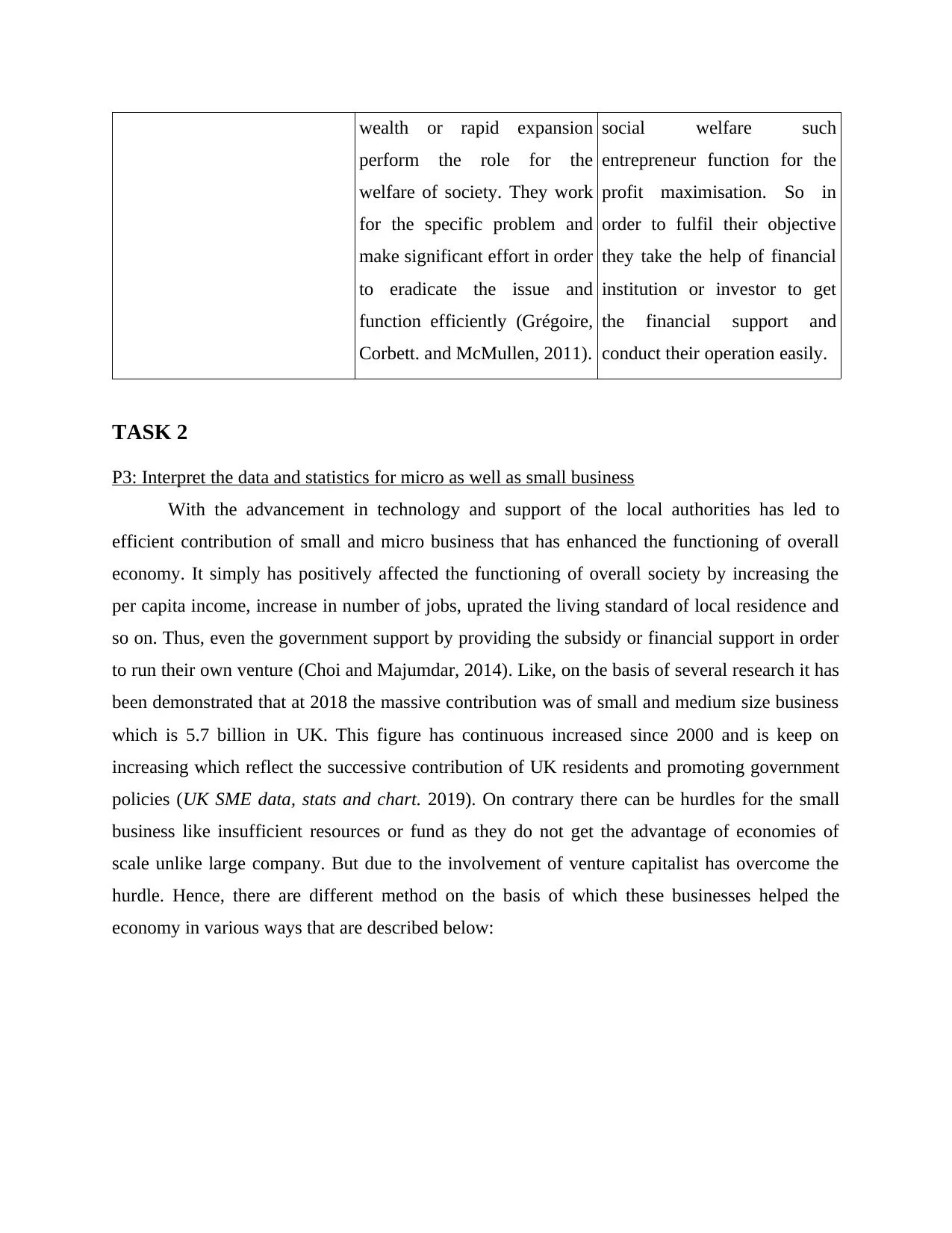
wealth or rapid expansion
perform the role for the
welfare of society. They work
for the specific problem and
make significant effort in order
to eradicate the issue and
function efficiently (Grégoire,
Corbett. and McMullen, 2011).
social welfare such
entrepreneur function for the
profit maximisation. So in
order to fulfil their objective
they take the help of financial
institution or investor to get
the financial support and
conduct their operation easily.
TASK 2
P3: Interpret the data and statistics for micro as well as small business
With the advancement in technology and support of the local authorities has led to
efficient contribution of small and micro business that has enhanced the functioning of overall
economy. It simply has positively affected the functioning of overall society by increasing the
per capita income, increase in number of jobs, uprated the living standard of local residence and
so on. Thus, even the government support by providing the subsidy or financial support in order
to run their own venture (Choi and Majumdar, 2014). Like, on the basis of several research it has
been demonstrated that at 2018 the massive contribution was of small and medium size business
which is 5.7 billion in UK. This figure has continuous increased since 2000 and is keep on
increasing which reflect the successive contribution of UK residents and promoting government
policies (UK SME data, stats and chart. 2019). On contrary there can be hurdles for the small
business like insufficient resources or fund as they do not get the advantage of economies of
scale unlike large company. But due to the involvement of venture capitalist has overcome the
hurdle. Hence, there are different method on the basis of which these businesses helped the
economy in various ways that are described below:
perform the role for the
welfare of society. They work
for the specific problem and
make significant effort in order
to eradicate the issue and
function efficiently (Grégoire,
Corbett. and McMullen, 2011).
social welfare such
entrepreneur function for the
profit maximisation. So in
order to fulfil their objective
they take the help of financial
institution or investor to get
the financial support and
conduct their operation easily.
TASK 2
P3: Interpret the data and statistics for micro as well as small business
With the advancement in technology and support of the local authorities has led to
efficient contribution of small and micro business that has enhanced the functioning of overall
economy. It simply has positively affected the functioning of overall society by increasing the
per capita income, increase in number of jobs, uprated the living standard of local residence and
so on. Thus, even the government support by providing the subsidy or financial support in order
to run their own venture (Choi and Majumdar, 2014). Like, on the basis of several research it has
been demonstrated that at 2018 the massive contribution was of small and medium size business
which is 5.7 billion in UK. This figure has continuous increased since 2000 and is keep on
increasing which reflect the successive contribution of UK residents and promoting government
policies (UK SME data, stats and chart. 2019). On contrary there can be hurdles for the small
business like insufficient resources or fund as they do not get the advantage of economies of
scale unlike large company. But due to the involvement of venture capitalist has overcome the
hurdle. Hence, there are different method on the basis of which these businesses helped the
economy in various ways that are described below:
Paraphrase This Document
Need a fresh take? Get an instant paraphrase of this document with our AI Paraphraser
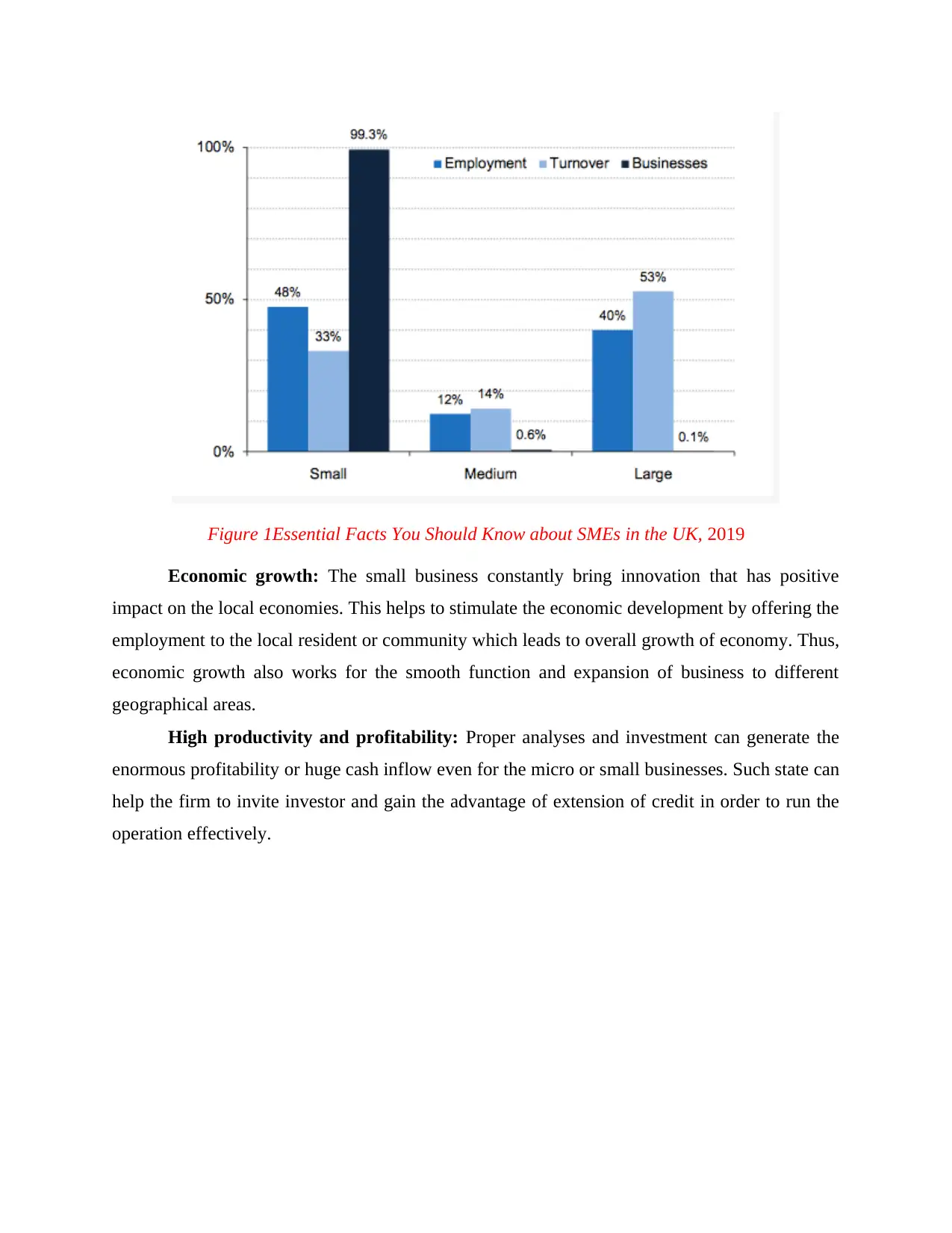
Figure 1Essential Facts You Should Know about SMEs in the UK, 2019
Economic growth: The small business constantly bring innovation that has positive
impact on the local economies. This helps to stimulate the economic development by offering the
employment to the local resident or community which leads to overall growth of economy. Thus,
economic growth also works for the smooth function and expansion of business to different
geographical areas.
High productivity and profitability: Proper analyses and investment can generate the
enormous profitability or huge cash inflow even for the micro or small businesses. Such state can
help the firm to invite investor and gain the advantage of extension of credit in order to run the
operation effectively.
Economic growth: The small business constantly bring innovation that has positive
impact on the local economies. This helps to stimulate the economic development by offering the
employment to the local resident or community which leads to overall growth of economy. Thus,
economic growth also works for the smooth function and expansion of business to different
geographical areas.
High productivity and profitability: Proper analyses and investment can generate the
enormous profitability or huge cash inflow even for the micro or small businesses. Such state can
help the firm to invite investor and gain the advantage of extension of credit in order to run the
operation effectively.
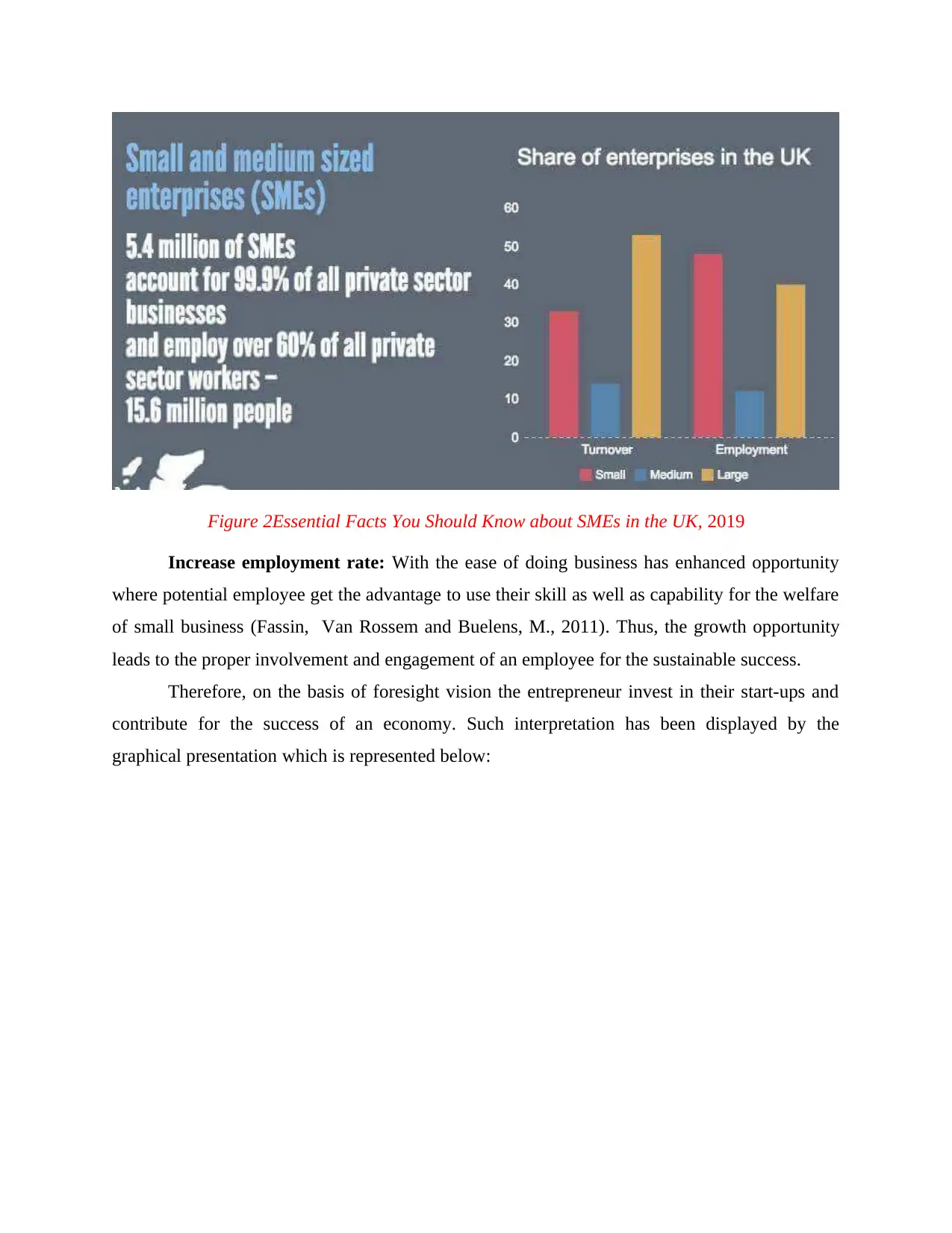
Figure 2Essential Facts You Should Know about SMEs in the UK, 2019
Increase employment rate: With the ease of doing business has enhanced opportunity
where potential employee get the advantage to use their skill as well as capability for the welfare
of small business (Fassin, Van Rossem and Buelens, M., 2011). Thus, the growth opportunity
leads to the proper involvement and engagement of an employee for the sustainable success.
Therefore, on the basis of foresight vision the entrepreneur invest in their start-ups and
contribute for the success of an economy. Such interpretation has been displayed by the
graphical presentation which is represented below:
Increase employment rate: With the ease of doing business has enhanced opportunity
where potential employee get the advantage to use their skill as well as capability for the welfare
of small business (Fassin, Van Rossem and Buelens, M., 2011). Thus, the growth opportunity
leads to the proper involvement and engagement of an employee for the sustainable success.
Therefore, on the basis of foresight vision the entrepreneur invest in their start-ups and
contribute for the success of an economy. Such interpretation has been displayed by the
graphical presentation which is represented below:
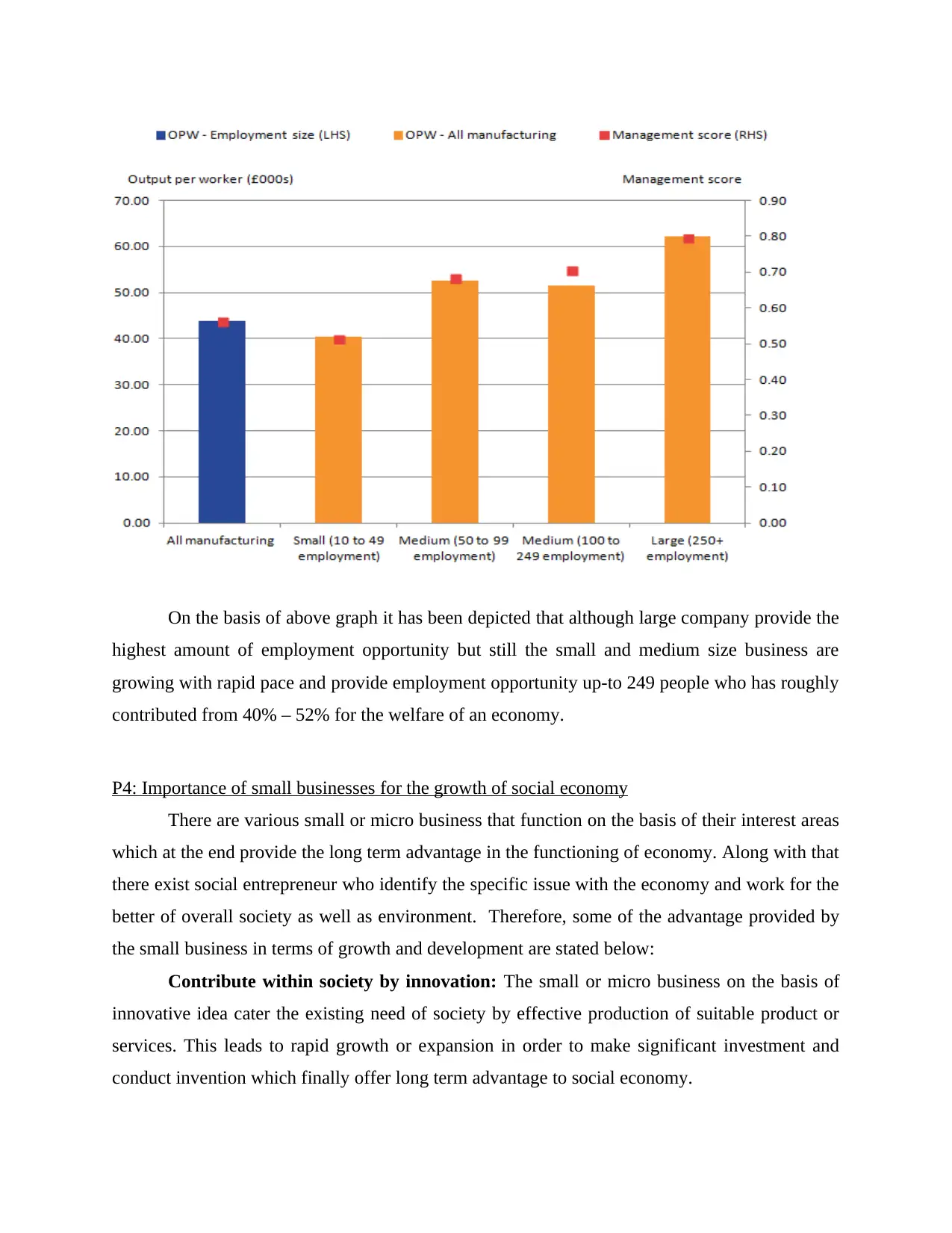
On the basis of above graph it has been depicted that although large company provide the
highest amount of employment opportunity but still the small and medium size business are
growing with rapid pace and provide employment opportunity up-to 249 people who has roughly
contributed from 40% – 52% for the welfare of an economy.
P4: Importance of small businesses for the growth of social economy
There are various small or micro business that function on the basis of their interest areas
which at the end provide the long term advantage in the functioning of economy. Along with that
there exist social entrepreneur who identify the specific issue with the economy and work for the
better of overall society as well as environment. Therefore, some of the advantage provided by
the small business in terms of growth and development are stated below:
Contribute within society by innovation: The small or micro business on the basis of
innovative idea cater the existing need of society by effective production of suitable product or
services. This leads to rapid growth or expansion in order to make significant investment and
conduct invention which finally offer long term advantage to social economy.
highest amount of employment opportunity but still the small and medium size business are
growing with rapid pace and provide employment opportunity up-to 249 people who has roughly
contributed from 40% – 52% for the welfare of an economy.
P4: Importance of small businesses for the growth of social economy
There are various small or micro business that function on the basis of their interest areas
which at the end provide the long term advantage in the functioning of economy. Along with that
there exist social entrepreneur who identify the specific issue with the economy and work for the
better of overall society as well as environment. Therefore, some of the advantage provided by
the small business in terms of growth and development are stated below:
Contribute within society by innovation: The small or micro business on the basis of
innovative idea cater the existing need of society by effective production of suitable product or
services. This leads to rapid growth or expansion in order to make significant investment and
conduct invention which finally offer long term advantage to social economy.
Secure Best Marks with AI Grader
Need help grading? Try our AI Grader for instant feedback on your assignments.
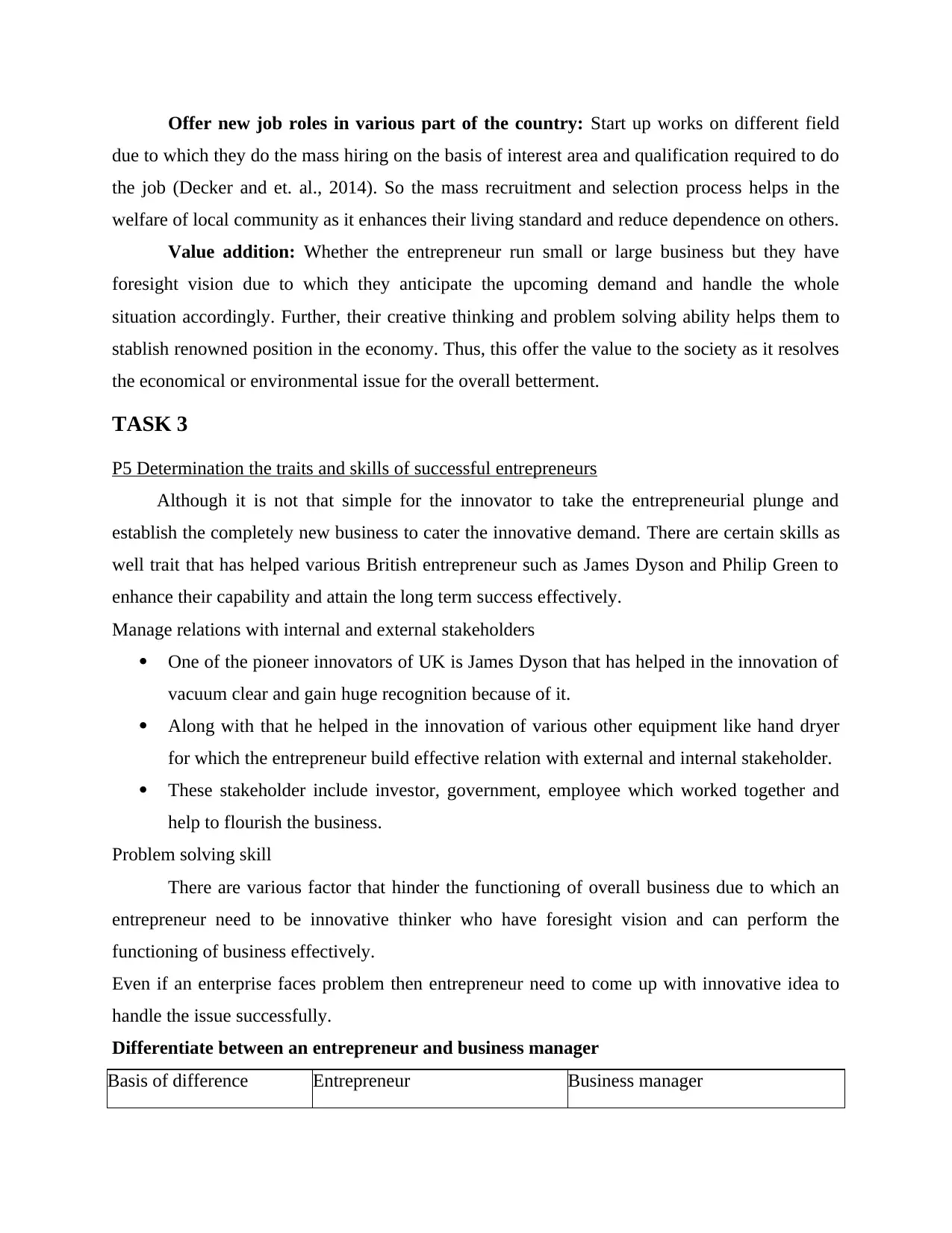
Offer new job roles in various part of the country: Start up works on different field
due to which they do the mass hiring on the basis of interest area and qualification required to do
the job (Decker and et. al., 2014). So the mass recruitment and selection process helps in the
welfare of local community as it enhances their living standard and reduce dependence on others.
Value addition: Whether the entrepreneur run small or large business but they have
foresight vision due to which they anticipate the upcoming demand and handle the whole
situation accordingly. Further, their creative thinking and problem solving ability helps them to
stablish renowned position in the economy. Thus, this offer the value to the society as it resolves
the economical or environmental issue for the overall betterment.
TASK 3
P5 Determination the traits and skills of successful entrepreneurs
Although it is not that simple for the innovator to take the entrepreneurial plunge and
establish the completely new business to cater the innovative demand. There are certain skills as
well trait that has helped various British entrepreneur such as James Dyson and Philip Green to
enhance their capability and attain the long term success effectively.
Manage relations with internal and external stakeholders
One of the pioneer innovators of UK is James Dyson that has helped in the innovation of
vacuum clear and gain huge recognition because of it.
Along with that he helped in the innovation of various other equipment like hand dryer
for which the entrepreneur build effective relation with external and internal stakeholder.
These stakeholder include investor, government, employee which worked together and
help to flourish the business.
Problem solving skill
There are various factor that hinder the functioning of overall business due to which an
entrepreneur need to be innovative thinker who have foresight vision and can perform the
functioning of business effectively.
Even if an enterprise faces problem then entrepreneur need to come up with innovative idea to
handle the issue successfully.
Differentiate between an entrepreneur and business manager
Basis of difference Entrepreneur Business manager
due to which they do the mass hiring on the basis of interest area and qualification required to do
the job (Decker and et. al., 2014). So the mass recruitment and selection process helps in the
welfare of local community as it enhances their living standard and reduce dependence on others.
Value addition: Whether the entrepreneur run small or large business but they have
foresight vision due to which they anticipate the upcoming demand and handle the whole
situation accordingly. Further, their creative thinking and problem solving ability helps them to
stablish renowned position in the economy. Thus, this offer the value to the society as it resolves
the economical or environmental issue for the overall betterment.
TASK 3
P5 Determination the traits and skills of successful entrepreneurs
Although it is not that simple for the innovator to take the entrepreneurial plunge and
establish the completely new business to cater the innovative demand. There are certain skills as
well trait that has helped various British entrepreneur such as James Dyson and Philip Green to
enhance their capability and attain the long term success effectively.
Manage relations with internal and external stakeholders
One of the pioneer innovators of UK is James Dyson that has helped in the innovation of
vacuum clear and gain huge recognition because of it.
Along with that he helped in the innovation of various other equipment like hand dryer
for which the entrepreneur build effective relation with external and internal stakeholder.
These stakeholder include investor, government, employee which worked together and
help to flourish the business.
Problem solving skill
There are various factor that hinder the functioning of overall business due to which an
entrepreneur need to be innovative thinker who have foresight vision and can perform the
functioning of business effectively.
Even if an enterprise faces problem then entrepreneur need to come up with innovative idea to
handle the issue successfully.
Differentiate between an entrepreneur and business manager
Basis of difference Entrepreneur Business manager
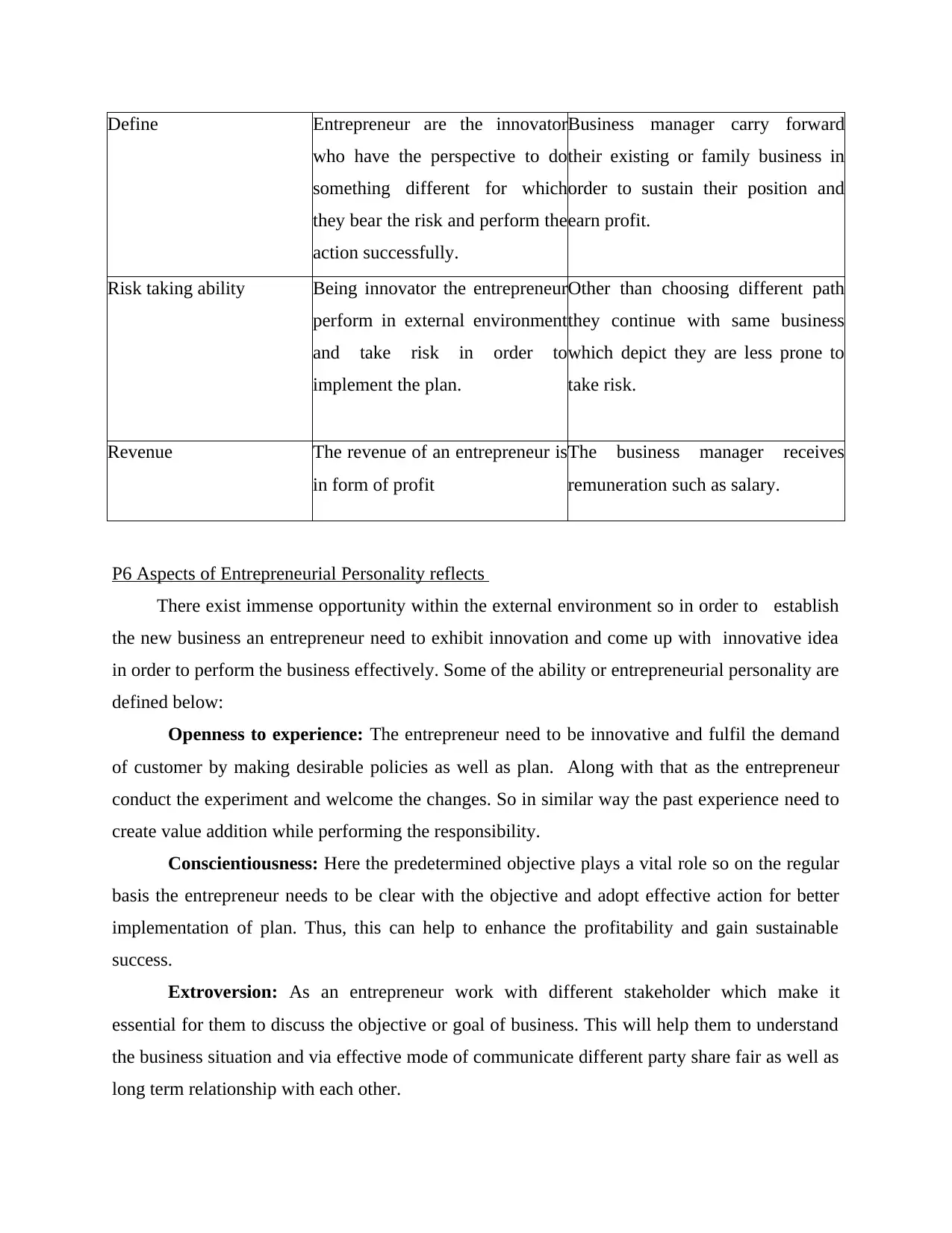
Define Entrepreneur are the innovator
who have the perspective to do
something different for which
they bear the risk and perform the
action successfully.
Business manager carry forward
their existing or family business in
order to sustain their position and
earn profit.
Risk taking ability Being innovator the entrepreneur
perform in external environment
and take risk in order to
implement the plan.
Other than choosing different path
they continue with same business
which depict they are less prone to
take risk.
Revenue The revenue of an entrepreneur is
in form of profit
The business manager receives
remuneration such as salary.
P6 Aspects of Entrepreneurial Personality reflects
There exist immense opportunity within the external environment so in order to establish
the new business an entrepreneur need to exhibit innovation and come up with innovative idea
in order to perform the business effectively. Some of the ability or entrepreneurial personality are
defined below:
Openness to experience: The entrepreneur need to be innovative and fulfil the demand
of customer by making desirable policies as well as plan. Along with that as the entrepreneur
conduct the experiment and welcome the changes. So in similar way the past experience need to
create value addition while performing the responsibility.
Conscientiousness: Here the predetermined objective plays a vital role so on the regular
basis the entrepreneur needs to be clear with the objective and adopt effective action for better
implementation of plan. Thus, this can help to enhance the profitability and gain sustainable
success.
Extroversion: As an entrepreneur work with different stakeholder which make it
essential for them to discuss the objective or goal of business. This will help them to understand
the business situation and via effective mode of communicate different party share fair as well as
long term relationship with each other.
who have the perspective to do
something different for which
they bear the risk and perform the
action successfully.
Business manager carry forward
their existing or family business in
order to sustain their position and
earn profit.
Risk taking ability Being innovator the entrepreneur
perform in external environment
and take risk in order to
implement the plan.
Other than choosing different path
they continue with same business
which depict they are less prone to
take risk.
Revenue The revenue of an entrepreneur is
in form of profit
The business manager receives
remuneration such as salary.
P6 Aspects of Entrepreneurial Personality reflects
There exist immense opportunity within the external environment so in order to establish
the new business an entrepreneur need to exhibit innovation and come up with innovative idea
in order to perform the business effectively. Some of the ability or entrepreneurial personality are
defined below:
Openness to experience: The entrepreneur need to be innovative and fulfil the demand
of customer by making desirable policies as well as plan. Along with that as the entrepreneur
conduct the experiment and welcome the changes. So in similar way the past experience need to
create value addition while performing the responsibility.
Conscientiousness: Here the predetermined objective plays a vital role so on the regular
basis the entrepreneur needs to be clear with the objective and adopt effective action for better
implementation of plan. Thus, this can help to enhance the profitability and gain sustainable
success.
Extroversion: As an entrepreneur work with different stakeholder which make it
essential for them to discuss the objective or goal of business. This will help them to understand
the business situation and via effective mode of communicate different party share fair as well as
long term relationship with each other.
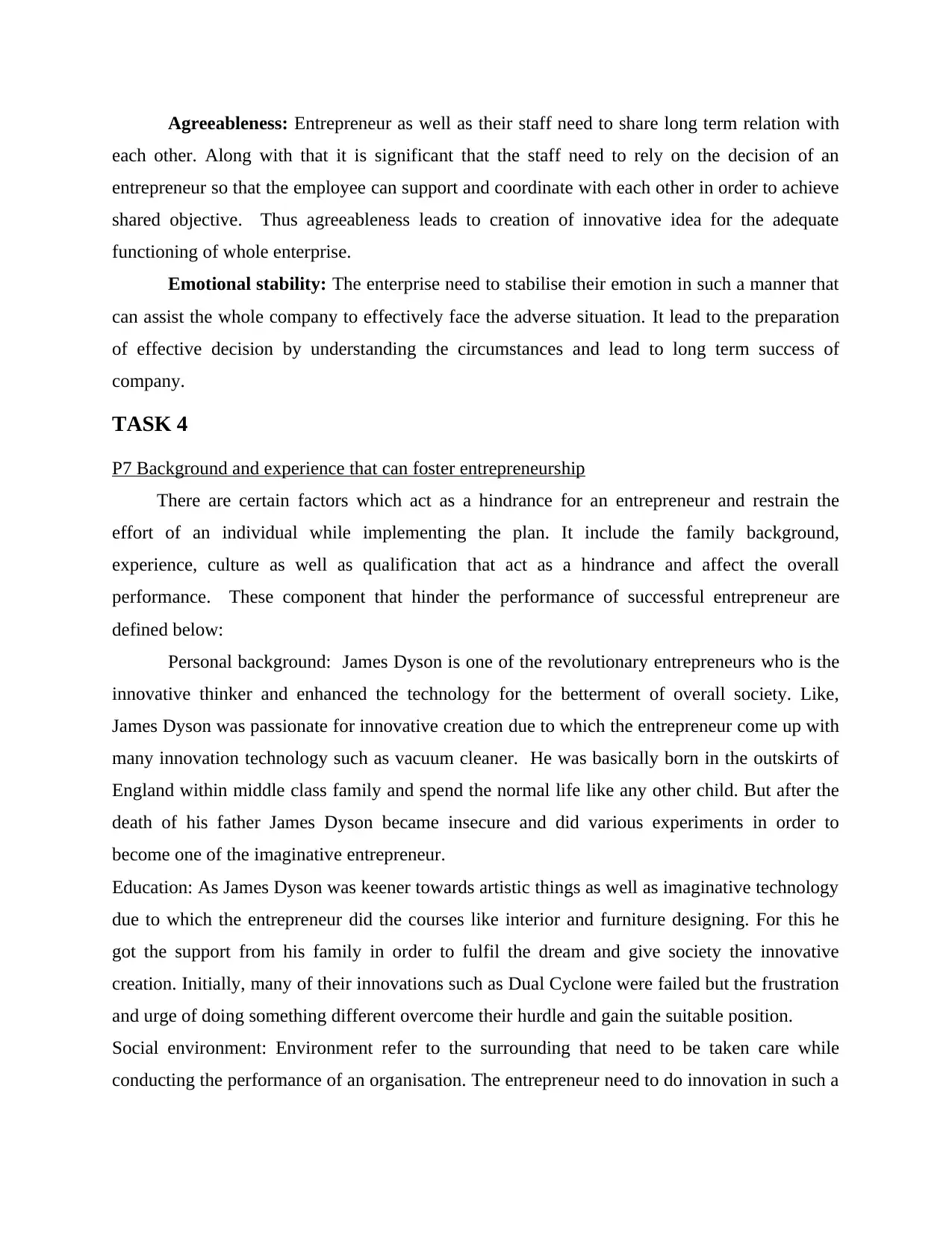
Agreeableness: Entrepreneur as well as their staff need to share long term relation with
each other. Along with that it is significant that the staff need to rely on the decision of an
entrepreneur so that the employee can support and coordinate with each other in order to achieve
shared objective. Thus agreeableness leads to creation of innovative idea for the adequate
functioning of whole enterprise.
Emotional stability: The enterprise need to stabilise their emotion in such a manner that
can assist the whole company to effectively face the adverse situation. It lead to the preparation
of effective decision by understanding the circumstances and lead to long term success of
company.
TASK 4
P7 Background and experience that can foster entrepreneurship
There are certain factors which act as a hindrance for an entrepreneur and restrain the
effort of an individual while implementing the plan. It include the family background,
experience, culture as well as qualification that act as a hindrance and affect the overall
performance. These component that hinder the performance of successful entrepreneur are
defined below:
Personal background: James Dyson is one of the revolutionary entrepreneurs who is the
innovative thinker and enhanced the technology for the betterment of overall society. Like,
James Dyson was passionate for innovative creation due to which the entrepreneur come up with
many innovation technology such as vacuum cleaner. He was basically born in the outskirts of
England within middle class family and spend the normal life like any other child. But after the
death of his father James Dyson became insecure and did various experiments in order to
become one of the imaginative entrepreneur.
Education: As James Dyson was keener towards artistic things as well as imaginative technology
due to which the entrepreneur did the courses like interior and furniture designing. For this he
got the support from his family in order to fulfil the dream and give society the innovative
creation. Initially, many of their innovations such as Dual Cyclone were failed but the frustration
and urge of doing something different overcome their hurdle and gain the suitable position.
Social environment: Environment refer to the surrounding that need to be taken care while
conducting the performance of an organisation. The entrepreneur need to do innovation in such a
each other. Along with that it is significant that the staff need to rely on the decision of an
entrepreneur so that the employee can support and coordinate with each other in order to achieve
shared objective. Thus agreeableness leads to creation of innovative idea for the adequate
functioning of whole enterprise.
Emotional stability: The enterprise need to stabilise their emotion in such a manner that
can assist the whole company to effectively face the adverse situation. It lead to the preparation
of effective decision by understanding the circumstances and lead to long term success of
company.
TASK 4
P7 Background and experience that can foster entrepreneurship
There are certain factors which act as a hindrance for an entrepreneur and restrain the
effort of an individual while implementing the plan. It include the family background,
experience, culture as well as qualification that act as a hindrance and affect the overall
performance. These component that hinder the performance of successful entrepreneur are
defined below:
Personal background: James Dyson is one of the revolutionary entrepreneurs who is the
innovative thinker and enhanced the technology for the betterment of overall society. Like,
James Dyson was passionate for innovative creation due to which the entrepreneur come up with
many innovation technology such as vacuum cleaner. He was basically born in the outskirts of
England within middle class family and spend the normal life like any other child. But after the
death of his father James Dyson became insecure and did various experiments in order to
become one of the imaginative entrepreneur.
Education: As James Dyson was keener towards artistic things as well as imaginative technology
due to which the entrepreneur did the courses like interior and furniture designing. For this he
got the support from his family in order to fulfil the dream and give society the innovative
creation. Initially, many of their innovations such as Dual Cyclone were failed but the frustration
and urge of doing something different overcome their hurdle and gain the suitable position.
Social environment: Environment refer to the surrounding that need to be taken care while
conducting the performance of an organisation. The entrepreneur need to do innovation in such a
Paraphrase This Document
Need a fresh take? Get an instant paraphrase of this document with our AI Paraphraser
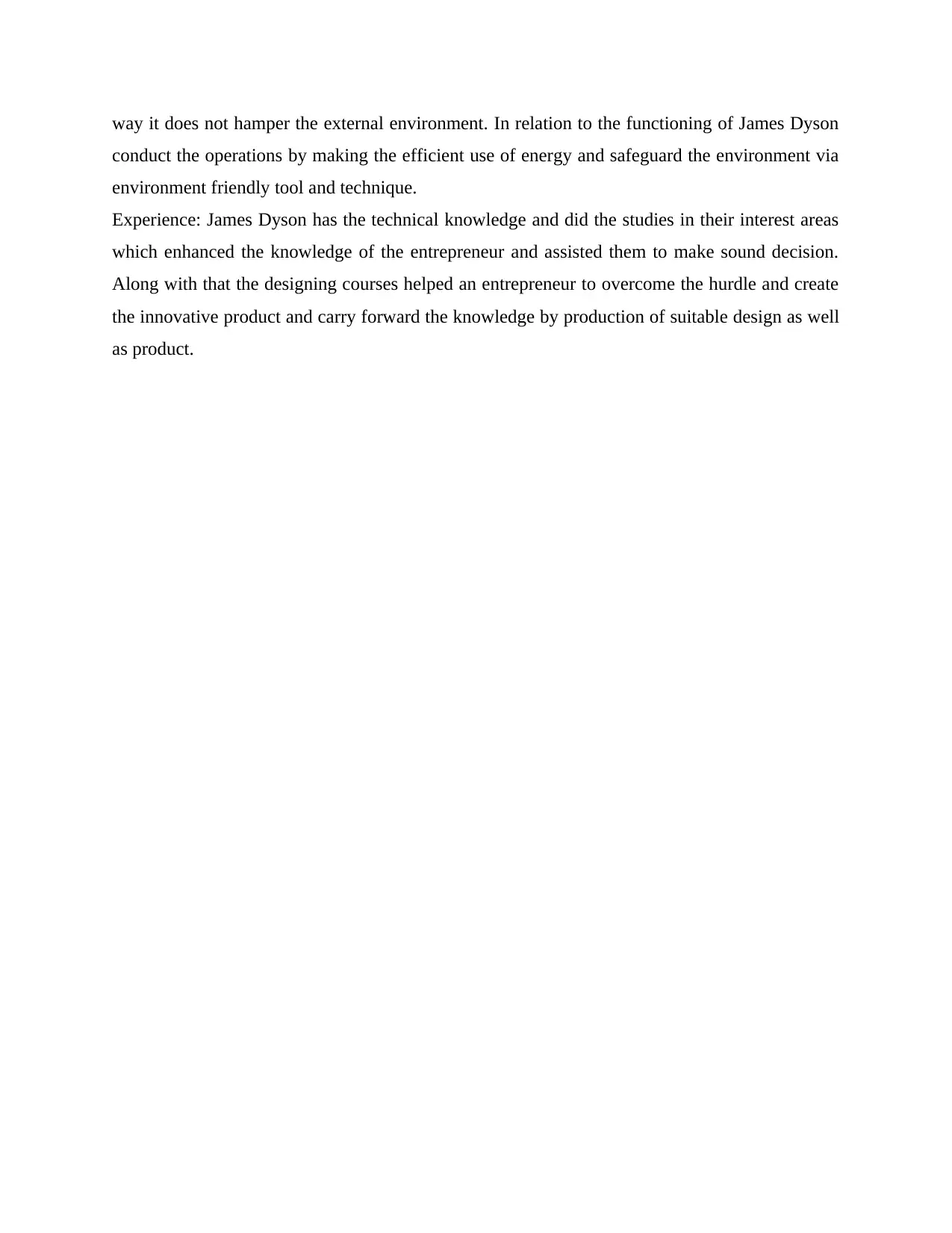
way it does not hamper the external environment. In relation to the functioning of James Dyson
conduct the operations by making the efficient use of energy and safeguard the environment via
environment friendly tool and technique.
Experience: James Dyson has the technical knowledge and did the studies in their interest areas
which enhanced the knowledge of the entrepreneur and assisted them to make sound decision.
Along with that the designing courses helped an entrepreneur to overcome the hurdle and create
the innovative product and carry forward the knowledge by production of suitable design as well
as product.
conduct the operations by making the efficient use of energy and safeguard the environment via
environment friendly tool and technique.
Experience: James Dyson has the technical knowledge and did the studies in their interest areas
which enhanced the knowledge of the entrepreneur and assisted them to make sound decision.
Along with that the designing courses helped an entrepreneur to overcome the hurdle and create
the innovative product and carry forward the knowledge by production of suitable design as well
as product.
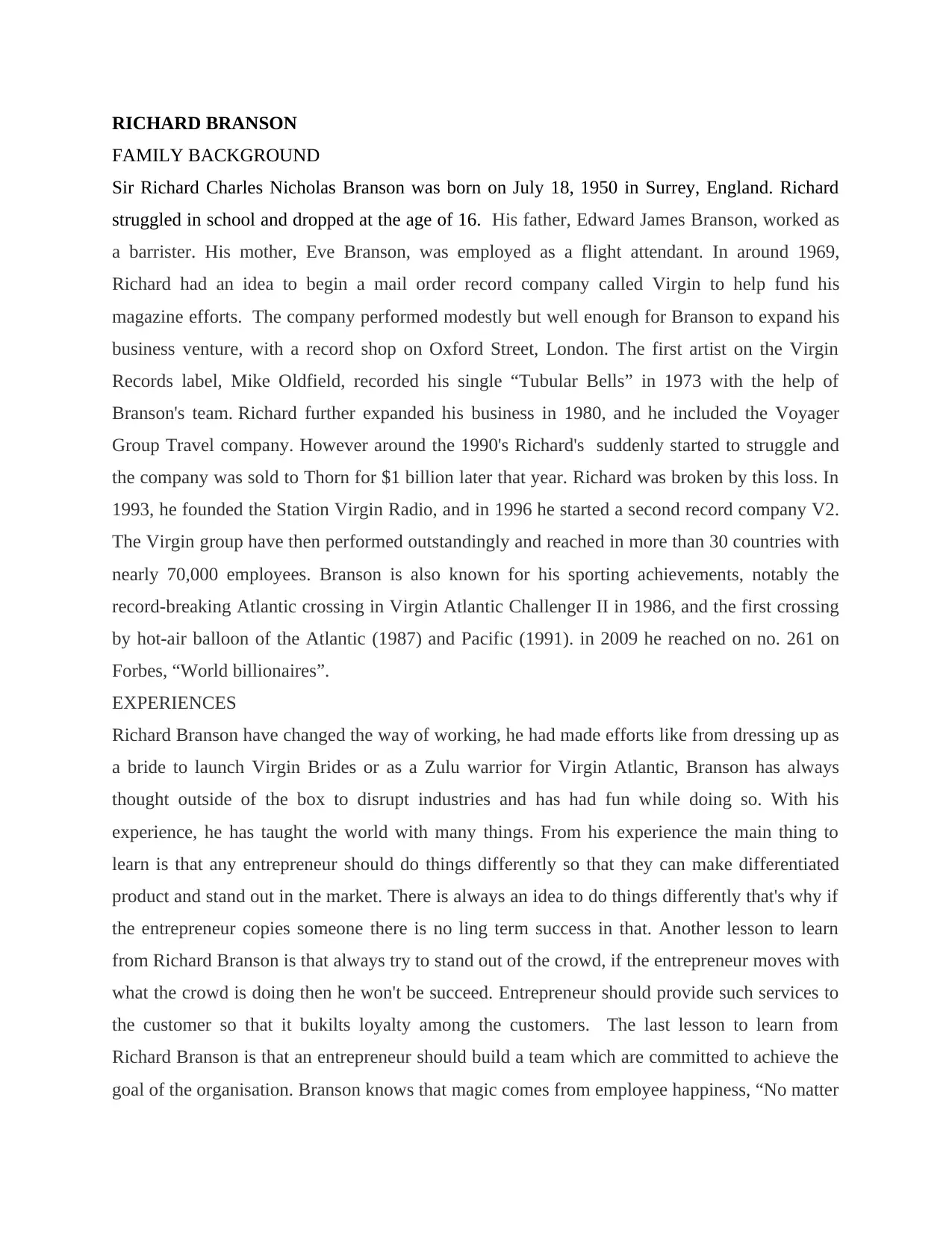
RICHARD BRANSON
FAMILY BACKGROUND
Sir Richard Charles Nicholas Branson was born on July 18, 1950 in Surrey, England. Richard
struggled in school and dropped at the age of 16. His father, Edward James Branson, worked as
a barrister. His mother, Eve Branson, was employed as a flight attendant. In around 1969,
Richard had an idea to begin a mail order record company called Virgin to help fund his
magazine efforts. The company performed modestly but well enough for Branson to expand his
business venture, with a record shop on Oxford Street, London. The first artist on the Virgin
Records label, Mike Oldfield, recorded his single “Tubular Bells” in 1973 with the help of
Branson's team. Richard further expanded his business in 1980, and he included the Voyager
Group Travel company. However around the 1990's Richard's suddenly started to struggle and
the company was sold to Thorn for $1 billion later that year. Richard was broken by this loss. In
1993, he founded the Station Virgin Radio, and in 1996 he started a second record company V2.
The Virgin group have then performed outstandingly and reached in more than 30 countries with
nearly 70,000 employees. Branson is also known for his sporting achievements, notably the
record-breaking Atlantic crossing in Virgin Atlantic Challenger II in 1986, and the first crossing
by hot-air balloon of the Atlantic (1987) and Pacific (1991). in 2009 he reached on no. 261 on
Forbes, “World billionaires”.
EXPERIENCES
Richard Branson have changed the way of working, he had made efforts like from dressing up as
a bride to launch Virgin Brides or as a Zulu warrior for Virgin Atlantic, Branson has always
thought outside of the box to disrupt industries and has had fun while doing so. With his
experience, he has taught the world with many things. From his experience the main thing to
learn is that any entrepreneur should do things differently so that they can make differentiated
product and stand out in the market. There is always an idea to do things differently that's why if
the entrepreneur copies someone there is no ling term success in that. Another lesson to learn
from Richard Branson is that always try to stand out of the crowd, if the entrepreneur moves with
what the crowd is doing then he won't be succeed. Entrepreneur should provide such services to
the customer so that it bukilts loyalty among the customers. The last lesson to learn from
Richard Branson is that an entrepreneur should build a team which are committed to achieve the
goal of the organisation. Branson knows that magic comes from employee happiness, “No matter
FAMILY BACKGROUND
Sir Richard Charles Nicholas Branson was born on July 18, 1950 in Surrey, England. Richard
struggled in school and dropped at the age of 16. His father, Edward James Branson, worked as
a barrister. His mother, Eve Branson, was employed as a flight attendant. In around 1969,
Richard had an idea to begin a mail order record company called Virgin to help fund his
magazine efforts. The company performed modestly but well enough for Branson to expand his
business venture, with a record shop on Oxford Street, London. The first artist on the Virgin
Records label, Mike Oldfield, recorded his single “Tubular Bells” in 1973 with the help of
Branson's team. Richard further expanded his business in 1980, and he included the Voyager
Group Travel company. However around the 1990's Richard's suddenly started to struggle and
the company was sold to Thorn for $1 billion later that year. Richard was broken by this loss. In
1993, he founded the Station Virgin Radio, and in 1996 he started a second record company V2.
The Virgin group have then performed outstandingly and reached in more than 30 countries with
nearly 70,000 employees. Branson is also known for his sporting achievements, notably the
record-breaking Atlantic crossing in Virgin Atlantic Challenger II in 1986, and the first crossing
by hot-air balloon of the Atlantic (1987) and Pacific (1991). in 2009 he reached on no. 261 on
Forbes, “World billionaires”.
EXPERIENCES
Richard Branson have changed the way of working, he had made efforts like from dressing up as
a bride to launch Virgin Brides or as a Zulu warrior for Virgin Atlantic, Branson has always
thought outside of the box to disrupt industries and has had fun while doing so. With his
experience, he has taught the world with many things. From his experience the main thing to
learn is that any entrepreneur should do things differently so that they can make differentiated
product and stand out in the market. There is always an idea to do things differently that's why if
the entrepreneur copies someone there is no ling term success in that. Another lesson to learn
from Richard Branson is that always try to stand out of the crowd, if the entrepreneur moves with
what the crowd is doing then he won't be succeed. Entrepreneur should provide such services to
the customer so that it bukilts loyalty among the customers. The last lesson to learn from
Richard Branson is that an entrepreneur should build a team which are committed to achieve the
goal of the organisation. Branson knows that magic comes from employee happiness, “No matter
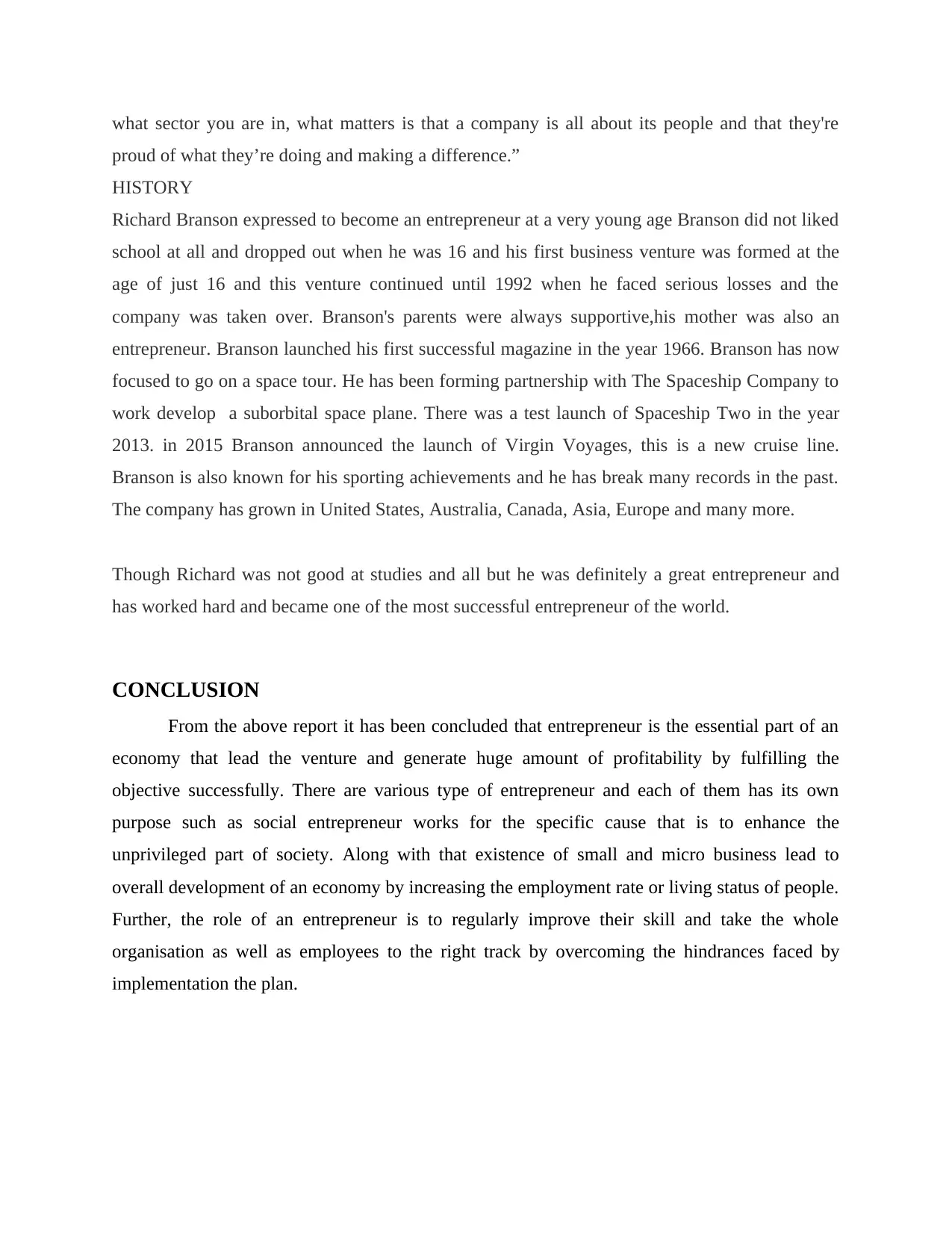
what sector you are in, what matters is that a company is all about its people and that they're
proud of what they’re doing and making a difference.”
HISTORY
Richard Branson expressed to become an entrepreneur at a very young age Branson did not liked
school at all and dropped out when he was 16 and his first business venture was formed at the
age of just 16 and this venture continued until 1992 when he faced serious losses and the
company was taken over. Branson's parents were always supportive,his mother was also an
entrepreneur. Branson launched his first successful magazine in the year 1966. Branson has now
focused to go on a space tour. He has been forming partnership with The Spaceship Company to
work develop a suborbital space plane. There was a test launch of Spaceship Two in the year
2013. in 2015 Branson announced the launch of Virgin Voyages, this is a new cruise line.
Branson is also known for his sporting achievements and he has break many records in the past.
The company has grown in United States, Australia, Canada, Asia, Europe and many more.
Though Richard was not good at studies and all but he was definitely a great entrepreneur and
has worked hard and became one of the most successful entrepreneur of the world.
CONCLUSION
From the above report it has been concluded that entrepreneur is the essential part of an
economy that lead the venture and generate huge amount of profitability by fulfilling the
objective successfully. There are various type of entrepreneur and each of them has its own
purpose such as social entrepreneur works for the specific cause that is to enhance the
unprivileged part of society. Along with that existence of small and micro business lead to
overall development of an economy by increasing the employment rate or living status of people.
Further, the role of an entrepreneur is to regularly improve their skill and take the whole
organisation as well as employees to the right track by overcoming the hindrances faced by
implementation the plan.
proud of what they’re doing and making a difference.”
HISTORY
Richard Branson expressed to become an entrepreneur at a very young age Branson did not liked
school at all and dropped out when he was 16 and his first business venture was formed at the
age of just 16 and this venture continued until 1992 when he faced serious losses and the
company was taken over. Branson's parents were always supportive,his mother was also an
entrepreneur. Branson launched his first successful magazine in the year 1966. Branson has now
focused to go on a space tour. He has been forming partnership with The Spaceship Company to
work develop a suborbital space plane. There was a test launch of Spaceship Two in the year
2013. in 2015 Branson announced the launch of Virgin Voyages, this is a new cruise line.
Branson is also known for his sporting achievements and he has break many records in the past.
The company has grown in United States, Australia, Canada, Asia, Europe and many more.
Though Richard was not good at studies and all but he was definitely a great entrepreneur and
has worked hard and became one of the most successful entrepreneur of the world.
CONCLUSION
From the above report it has been concluded that entrepreneur is the essential part of an
economy that lead the venture and generate huge amount of profitability by fulfilling the
objective successfully. There are various type of entrepreneur and each of them has its own
purpose such as social entrepreneur works for the specific cause that is to enhance the
unprivileged part of society. Along with that existence of small and micro business lead to
overall development of an economy by increasing the employment rate or living status of people.
Further, the role of an entrepreneur is to regularly improve their skill and take the whole
organisation as well as employees to the right track by overcoming the hindrances faced by
implementation the plan.
Secure Best Marks with AI Grader
Need help grading? Try our AI Grader for instant feedback on your assignments.
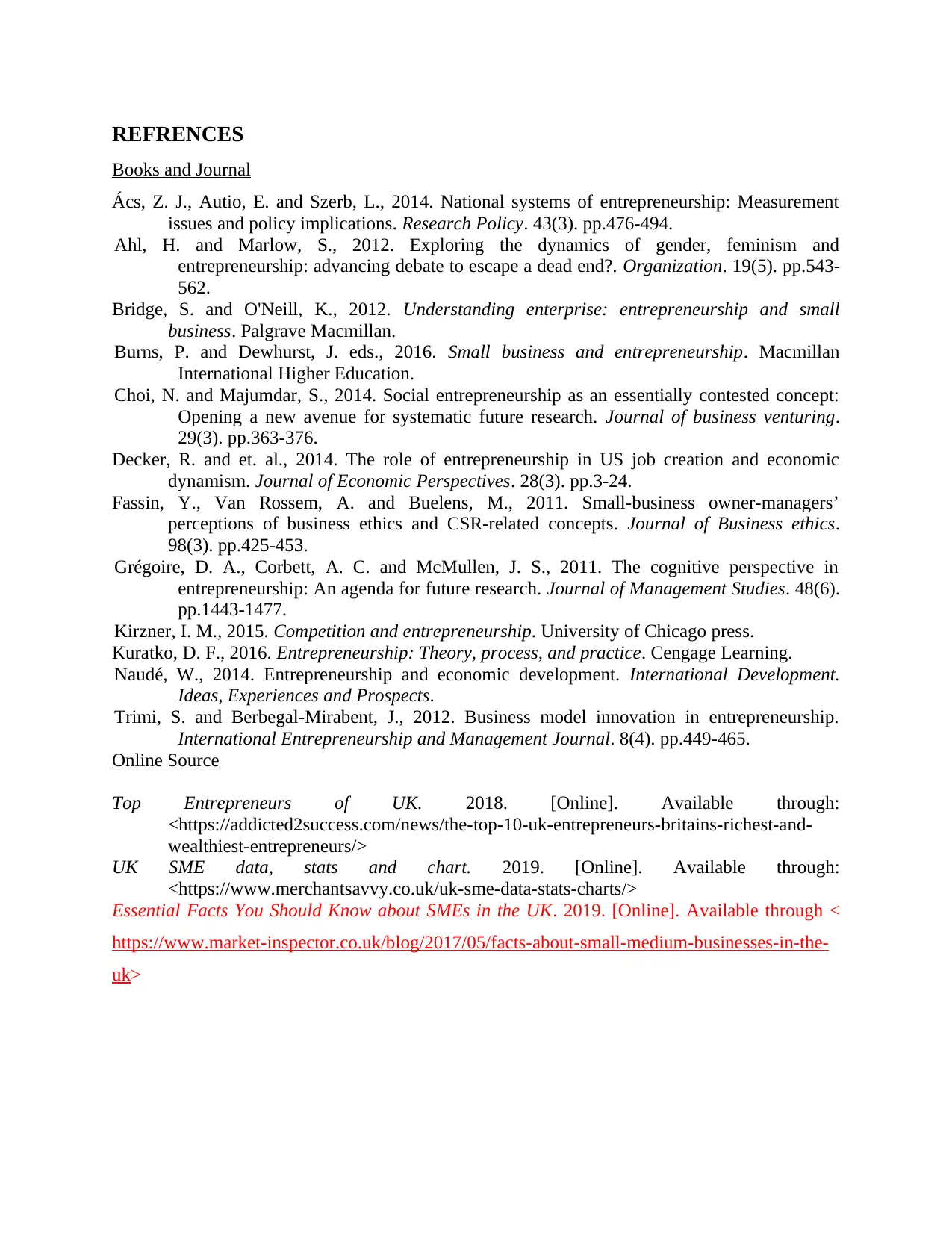
REFRENCES
Books and Journal
Ács, Z. J., Autio, E. and Szerb, L., 2014. National systems of entrepreneurship: Measurement
issues and policy implications. Research Policy. 43(3). pp.476-494.
Ahl, H. and Marlow, S., 2012. Exploring the dynamics of gender, feminism and
entrepreneurship: advancing debate to escape a dead end?. Organization. 19(5). pp.543-
562.
Bridge, S. and O'Neill, K., 2012. Understanding enterprise: entrepreneurship and small
business. Palgrave Macmillan.
Burns, P. and Dewhurst, J. eds., 2016. Small business and entrepreneurship. Macmillan
International Higher Education.
Choi, N. and Majumdar, S., 2014. Social entrepreneurship as an essentially contested concept:
Opening a new avenue for systematic future research. Journal of business venturing.
29(3). pp.363-376.
Decker, R. and et. al., 2014. The role of entrepreneurship in US job creation and economic
dynamism. Journal of Economic Perspectives. 28(3). pp.3-24.
Fassin, Y., Van Rossem, A. and Buelens, M., 2011. Small-business owner-managers’
perceptions of business ethics and CSR-related concepts. Journal of Business ethics.
98(3). pp.425-453.
Grégoire, D. A., Corbett, A. C. and McMullen, J. S., 2011. The cognitive perspective in
entrepreneurship: An agenda for future research. Journal of Management Studies. 48(6).
pp.1443-1477.
Kirzner, I. M., 2015. Competition and entrepreneurship. University of Chicago press.
Kuratko, D. F., 2016. Entrepreneurship: Theory, process, and practice. Cengage Learning.
Naudé, W., 2014. Entrepreneurship and economic development. International Development.
Ideas, Experiences and Prospects.
Trimi, S. and Berbegal-Mirabent, J., 2012. Business model innovation in entrepreneurship.
International Entrepreneurship and Management Journal. 8(4). pp.449-465.
Online Source
Top Entrepreneurs of UK. 2018. [Online]. Available through:
<https://addicted2success.com/news/the-top-10-uk-entrepreneurs-britains-richest-and-
wealthiest-entrepreneurs/>
UK SME data, stats and chart. 2019. [Online]. Available through:
<https://www.merchantsavvy.co.uk/uk-sme-data-stats-charts/>
Essential Facts You Should Know about SMEs in the UK. 2019. [Online]. Available through <
https://www.market-inspector.co.uk/blog/2017/05/facts-about-small-medium-businesses-in-the-
uk>
Books and Journal
Ács, Z. J., Autio, E. and Szerb, L., 2014. National systems of entrepreneurship: Measurement
issues and policy implications. Research Policy. 43(3). pp.476-494.
Ahl, H. and Marlow, S., 2012. Exploring the dynamics of gender, feminism and
entrepreneurship: advancing debate to escape a dead end?. Organization. 19(5). pp.543-
562.
Bridge, S. and O'Neill, K., 2012. Understanding enterprise: entrepreneurship and small
business. Palgrave Macmillan.
Burns, P. and Dewhurst, J. eds., 2016. Small business and entrepreneurship. Macmillan
International Higher Education.
Choi, N. and Majumdar, S., 2014. Social entrepreneurship as an essentially contested concept:
Opening a new avenue for systematic future research. Journal of business venturing.
29(3). pp.363-376.
Decker, R. and et. al., 2014. The role of entrepreneurship in US job creation and economic
dynamism. Journal of Economic Perspectives. 28(3). pp.3-24.
Fassin, Y., Van Rossem, A. and Buelens, M., 2011. Small-business owner-managers’
perceptions of business ethics and CSR-related concepts. Journal of Business ethics.
98(3). pp.425-453.
Grégoire, D. A., Corbett, A. C. and McMullen, J. S., 2011. The cognitive perspective in
entrepreneurship: An agenda for future research. Journal of Management Studies. 48(6).
pp.1443-1477.
Kirzner, I. M., 2015. Competition and entrepreneurship. University of Chicago press.
Kuratko, D. F., 2016. Entrepreneurship: Theory, process, and practice. Cengage Learning.
Naudé, W., 2014. Entrepreneurship and economic development. International Development.
Ideas, Experiences and Prospects.
Trimi, S. and Berbegal-Mirabent, J., 2012. Business model innovation in entrepreneurship.
International Entrepreneurship and Management Journal. 8(4). pp.449-465.
Online Source
Top Entrepreneurs of UK. 2018. [Online]. Available through:
<https://addicted2success.com/news/the-top-10-uk-entrepreneurs-britains-richest-and-
wealthiest-entrepreneurs/>
UK SME data, stats and chart. 2019. [Online]. Available through:
<https://www.merchantsavvy.co.uk/uk-sme-data-stats-charts/>
Essential Facts You Should Know about SMEs in the UK. 2019. [Online]. Available through <
https://www.market-inspector.co.uk/blog/2017/05/facts-about-small-medium-businesses-in-the-
uk>

UK SME Data, Stats &
Charts
UK SME Data, Stats &
Charts
Charts
UK SME Data, Stats &
Charts
1 out of 18
Related Documents
Your All-in-One AI-Powered Toolkit for Academic Success.
+13062052269
info@desklib.com
Available 24*7 on WhatsApp / Email
![[object Object]](/_next/static/media/star-bottom.7253800d.svg)
Unlock your academic potential
© 2024 | Zucol Services PVT LTD | All rights reserved.





